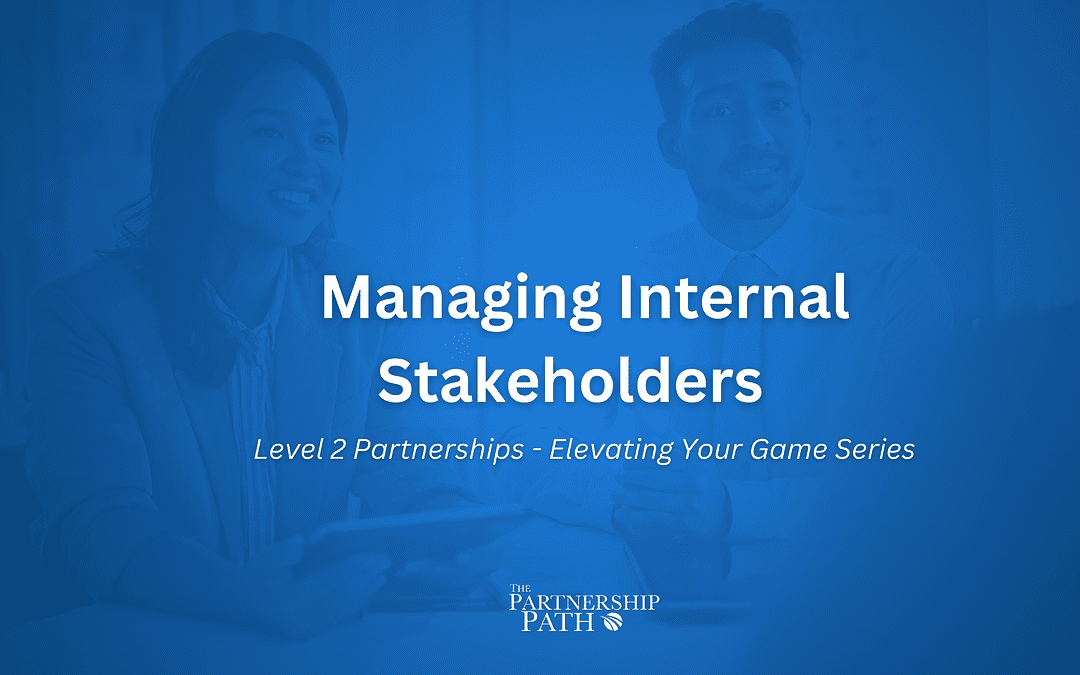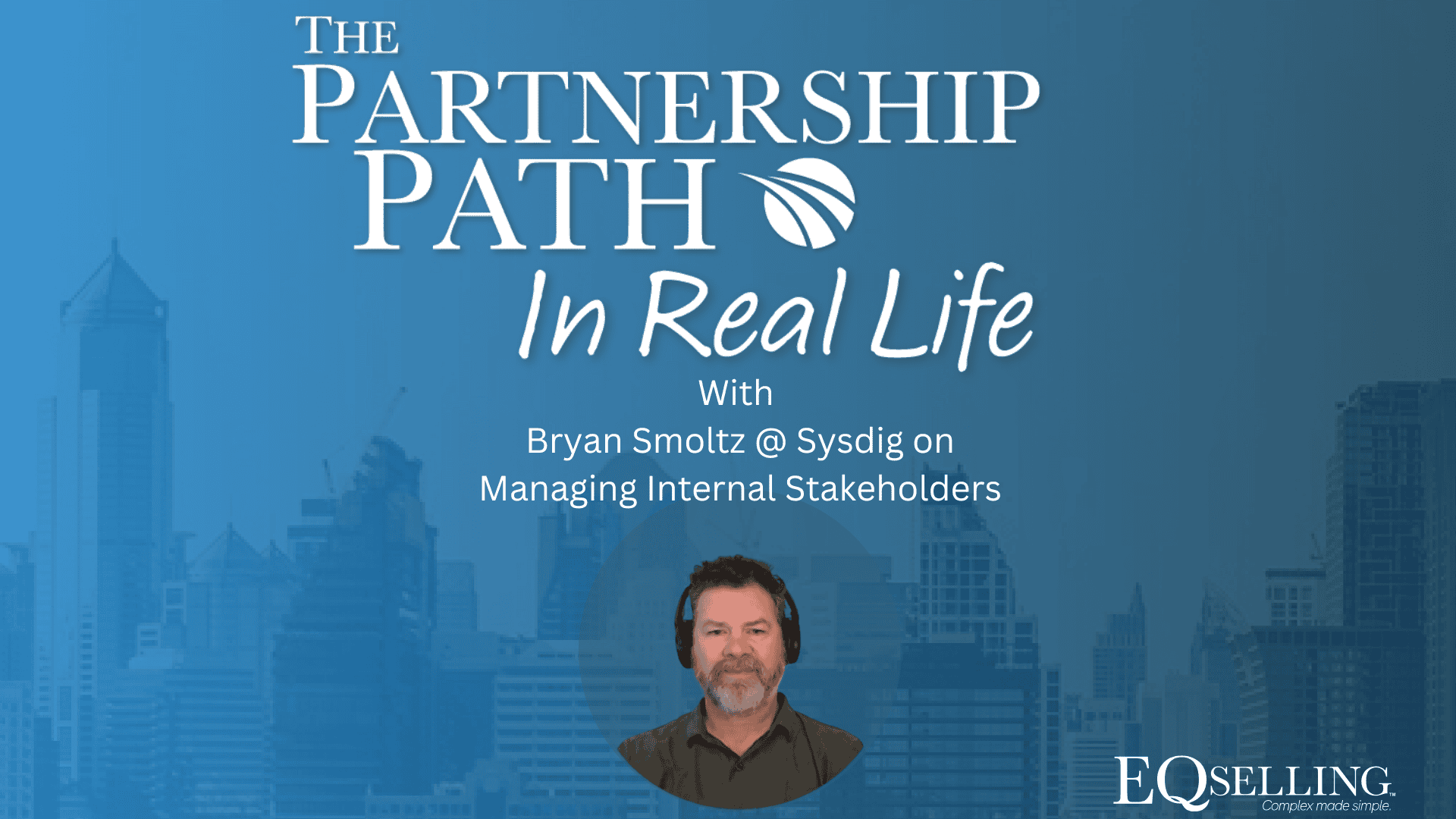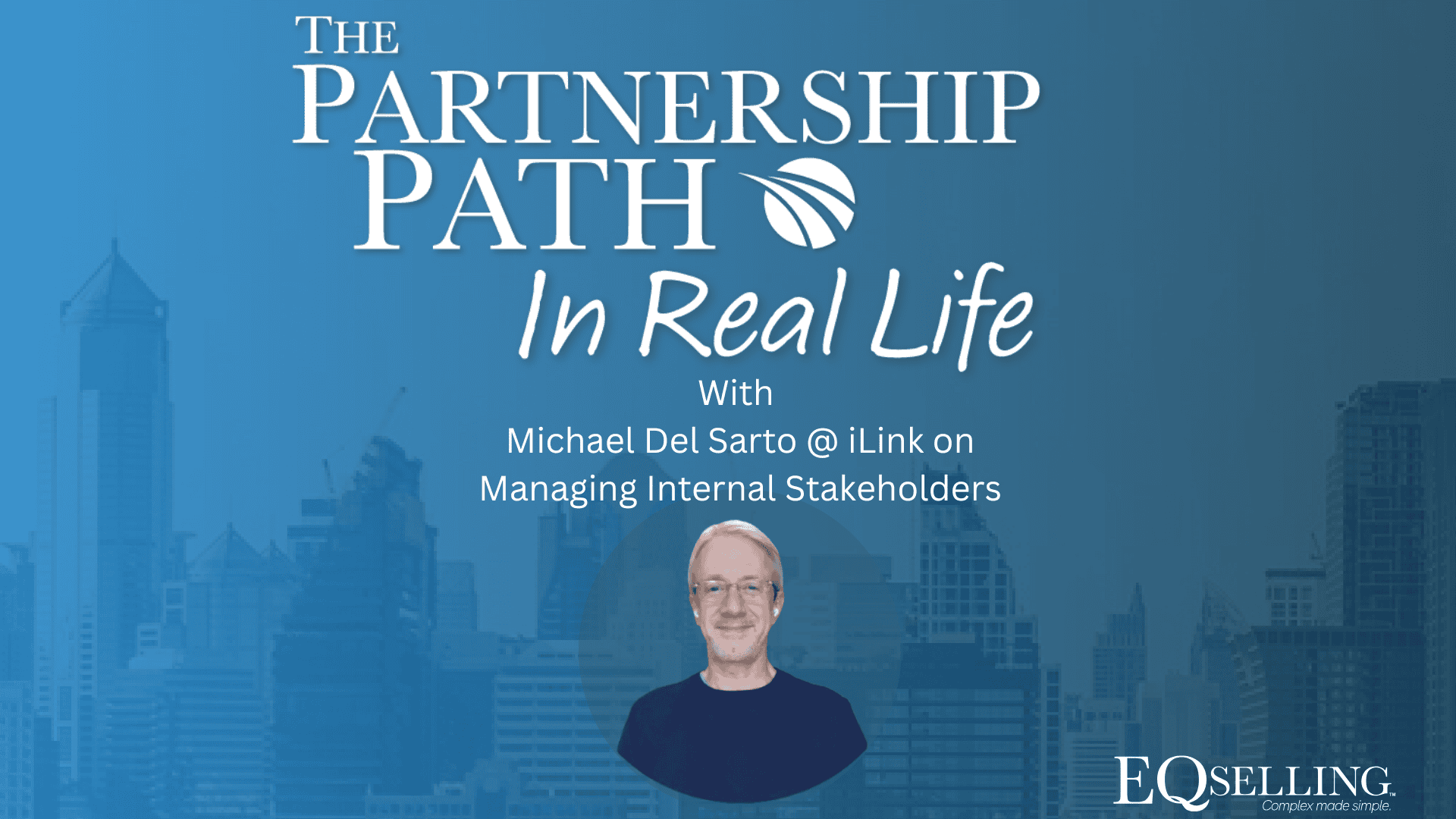Main Episode
Managing Internal Stakeholders
Episode Summary
Building effective partnerships often starts behind the scenes—managing internal stakeholders is crucial for long-term success in any collaboration. In this episode of “The Partnership Path”, hosts John Rudow and Toni Kent dive deep into the nuances of stakeholder dynamics, drawing parallels between personal relationships and professional collaborations.
By sharing real-life experiences and practical insights, they demonstrate the importance of empathy, clear communication, and strategic planning in managing expectations and achieving mutual goals. In a world where connecting the right people can determine the trajectory of projects, understanding how to engage effectively with internal stakeholders is a vital skill.
Transcript
John (00:01)
Good morning, good afternoon, good evening, Toni. So good to see you again for another episode of the Partnership Path. Super excited that we’re on this journey together and I love having these conversations with you. So super, super excited to do another one.
Toni (00:04)
good night. Hello.
Yeah,
yes, yeah, season three has been an interesting season, so it’s all good stuff,
John (00:24)
Yeah. Hard ones. These are hard topics. is, you know, we called this elevating your game for a reason, because these are more challenging topics than the stuff we did in seasons one and two.
Toni (00:32)
Yeah
Well, I’ve had to make a load of notes for this one. yeah, in fact, I’m actually going to grab them. Let’s just break the fourth wall a minute and I can, yeah. Because I’ve got quotes here from the in real life episodes. And I think it’s really showing us how getting that feedback from the field is so important. Yeah.
John (00:40)
I
Yeah, yeah.
Totally. Yeah,
yeah, I love how we do this. This combination is super, super strong. So today’s topic, we’re gonna talk about managing internal stakeholders, which, you’re married, yes? How long have you been married, Toni?
Toni (01:02)
Hmm. Yeah.
Hmm.
At the time of recording, 24 years. 24 years. Yeah.
John (01:20)
You
Alright, so we’re similar. just recently
had my anniversary and so we’re at 27. And do you still remember your wedding?
Toni (01:35)
I was going to say do you still love your husband? Yes. I still remember, so we met 29 years ago, so not only do I, I still remember our wedding day and I still remember the night that we met. So yes, it’s your aunt. Yeah. Yeah. Do you?
John (01:38)
No, no, of course you do.
Well, where I was going
with that was the… We did not have to do a lot of this, but I have heard… We did a little bit, and I have heard nightmare stories of other people who had to do a lot of this where for the reception, they had to spend a lot of time carefully planning where people were going to sit so that the wrong people weren’t like…
Toni (02:09)
Hmm.
John (02:19)
you know, sitting at the same table, like, you know, relatives who didn’t get along or, know, that kind of stuff. This whole managing internal stakeholders kind of idea around your wedding, right, of making sure that we’ve got people in the right places. We’ve set their expectations. We’ve given them the rules, right? Did you have to do any of that at your wedding?
Toni (02:19)
Yeah
yeah.
Yeah.
Well, and I can be completely open with you about this and with the audience. So it is bright because…
The people that I’m talking about are dearly departed. So it’s all right. Yeah, I’m not involved in that. So what happened was, booked our wedding. So we booked our wedding and then invited everyone. So our parents had no idea that we planned to get married. So we booked our wedding and sent out the invitations and I invited my
John (02:53)
all right, well there. And probably not in our audience anyway, yeah, even if they weren’t, yeah.
okay. Yep.
Toni (03:20)
maternal grandmother to the reception. And she phoned me up because she didn’t speak to my mum. So I was like, my God, I can’t have my mother and my grandmother having an argument at my wedding. So I thought, I’ll invite my grandmother to the reception. And she phoned me up going, what on earth? What do you mean I am not invited to the ceremony? I’m your grandmother. I don’t want to come to your reception. And I was like,
John (03:33)
Ugh. Right.
Toni (03:50)
So what I did was I told her and I told my mother I said you could both come but you’ve got to behave yourselves but it was I wasn’t expecting to get a phone call saying what do you mean I’m I’m not invited so that I found that I had to be direct and upfront and remind people that they had to behave if they wanted to come so there you are yeah
John (03:58)
Yeah.
Yeah.
Yeah. Yeah. So I,
I had, I honestly, I couldn’t have asked for a better story, Toni. That’s a, but thank you for that. And thank you for willing to share it, but that that’s brutal. And, it is exactly the issue, right? Which is, man, you gotta, you gotta be thinking about, I mean, in partnership, right? We spend almost all of our time thinking about the partner.
Toni (04:24)
It’s true.
It wants. It might, yeah.
Yeah.
Mm.
John (04:46)
when in reality there’s these internal people that can sometimes be helpful and sometimes not. This topic, I have to give a shout out to one of our listeners who actually suggested this topic because they were struggling with a internal stakeholder. They were relatively small company partnering though with a very large company.
Toni (04:53)
Yeah.
Yes.
John (05:17)
You know, the issue was, hey, the CEO of the small company felt that they deserved an audience with the CEO of the really big company, right? Because we both have CEO titles, right? Have you? Tell me about that. I mean, I know you’ve got tons of these kinds of stories.
Toni (05:26)
Yeah.
Yeah, been there as well, yeah.
So we.
We had a tele-managed partner and I headed up the tele-PAM team and the tele-managed partner said exactly that. I want to meet with the, with the UK MD because I run, but, but they were, you know, a very, a small niche, partner who, yeah, they said, I want an audience with your MD. And we said, you can’t have that. and he wasn’t having it. It was really difficult.
really, really did, because there was no way on this earth that I was going to convince the UKMD to meet with this person. But equally, he was insistent that that’s what was going to happen. It was really hard.
John (06:22)
Yeah.
Yeah. Setting. So this is the challenge, right? So I think everyone listening probably has a similar horror story of being able to, you what do we do about that? How do we manage that? And I’ll be honest, I think this is one of the most difficult things to do in any job is to manage expectations with those stakeholders and players that are involved.
Toni (06:28)
Yeah.
Yeah.
Yeah.
Yeah.
John (06:52)
who, you know, I mean, my thing always is one of my, trick isn’t really the right word, but one of the things I always recommend, right, is to help people see the reality of the business that they manage. Right. And this works in both directions, by the way, because I think when we’re young partner people,
Toni (07:10)
Hmm.
John (07:18)
who think that they can’t meet with senior executives at their partners because they’re just a partner manager, and to help them see the book of business that they manage. So as a PAM, as a partner business development manager, whatever your title is, what book of business do you manage? Are you managing a $5 million book of business, a $20 million book of business, a $100 million book of business? Because that…
Toni (07:24)
Hmm.
Yeah.
Hmm.
John (07:46)
puts you at a particular level that you should be able to meet with someone else who is running a similar or smaller size book of business, right? Which in the example you’re talking about, I would bet that the CEO you’re talking about was managing a very small book of business. His business was pretty minute compared to the UK GM who was managing a, you know, probably a couple billion dollar business, you know.
Toni (07:54)
Yeah.
Yeah.
John (08:17)
Where is that parity? Like to help people see, hey, this is why that can’t happen. Like I can get you in front of someone who’s managing a book of business similar to yours or even a little bit larger, you know, someone who’s managing this massive book of business can’t, they can’t meet with everyone who is running that, right?
Toni (08:19)
Yeah.
Yeah.
No, and I think it’s quite, there’s a sort of a challenge in communicating that in a positive way, I think. And that is where I think there is a lot of the, I guess, the skill that comes in with that, you know, partner management role is the ability to kind of talk in such a way that shows respect and empathy, whilst also being pragmatic and realistic about what’s possible. Yeah.
John (08:45)
Right. Yeah.
Yeah. Yeah.
Yeah. And I think so that’s perfect, perfect point, Toni, which is there’s a lot of EQ that has to come into this, a lot of emotional intelligence that’s required in this. Right. And, a big chunk of that means kind of analyzing your internal stakeholders the same way we encourage you to analyze your external stakeholders, really sitting down and saying, okay, for this stakeholder, what motivates them?
Toni (09:16)
Yeah.
Mm.
Yeah.
Yeah.
John (09:35)
What are
their, like this CEO that you’re talking about, like what did he want? What was he trying to get out of that? Why was that important? Was it purely an ego thing? Was it some business issue that he had? Like what was that motivation? If I can figure that out, I can probably find an alternate solution to bring to the table that meets that motivation, right? What is it that they really want? And then.
Toni (09:45)
Yeah.
Hmm.
Yeah.
And I do think,
sorry, just didn’t talk across you, John, if I may. But one thing, if I think about like internal, internal, where I had had a challenge with a much more senior colleague, speaking to other people within your business can be a really valuable…
John (10:05)
No, no, go ahead. Yes.
Toni (10:26)
thing to do. And I think there is the temptation to go, no, I can deal with it myself. I’ll sort it out myself. I’ll figure out how to make it work. But if you feel stuck, I think there’s a lot to be said for approaching a colleague who’s perhaps more experienced than you or in a different business unit and just saying, I’ve got this challenge. How would you approach it? And that has been such a gift to me throughout my career. But sometimes we feel nervous to ask because we think that it shows that we
John (10:51)
Yeah. Yeah.
Toni (10:56)
maybe not as good at our job as we’re supposed to be.
John (11:00)
So I don’t think you meant to do this, Toni, but that’s a plug for this podcast and this community, right? Because even if you’re not comfortable asking someone in your own organization, that’s part of what we’re trying to do here is create a community where you could ask someone else in the community, hey, who’s had this experience? Do you have any advice for me? Like, what’s your…
Toni (11:11)
Hmm.
Mm-hmm. Yeah.
Yeah.
John (11:28)
You know, what’s your take on this? How have you done it in the past? That’s exactly why we started this podcast. I know that’s not exactly what you’re trying to do, but I can’t pass that up to say, yes, yes, yes, yes, that’s exactly what we want to do here. Because it is so important. You’re never going to know it all. You’re never going to have experience at everything. There’s always new situations. And being able to have people that you can reach out to and ask their advice, it’s critical. And you have to do that. We need you to do that.
Toni (11:51)
Hmm.
Yeah, and I suppose like you say, actually, it is that having a sense of community and peers that you can ask without fear of reproach. But there was a comment from one of the guests, going to look at my notes here. It was Vicky at Splunk. And she said like issues or escalations or issues like this can be an opportunity to strengthen a partnership.
John (12:08)
Yeah.
Toni (12:27)
But and by the same token, guess a chance to an opportunity to strengthen your own skills and grow your knowledge. So, yeah, yeah, absolutely.
John (12:33)
Right, right. Yeah.
Yeah, I think, look, we try in these episodes to give some super helpful advice, right? So the first one was, hey, be realistic, right? Try and help them kind of see the reality of book of business size and kind of help rationalize, right? But then acknowledging that there’s an emotional element to this and really…
Toni (12:52)
Yeah.
Hmm.
John (13:00)
applying some emotional intelligence to the way you analyze your internal stakeholders and figuring out what their motivation is and trying to work there. And then the third for me, the third thing I would recommend is that you essentially engage that stakeholder collaboratively on how to get what they want. Because sometimes I think senior executives in particular believe they don’t spend enough time thinking about what they’re asking.
Toni (13:18)
Yeah. Yeah.
John (13:30)
to have thought through the complexity of what they’re asking. And so it’s not that they’re unrealistic or whatever. It’s that they’re busy thinking about other things and so they’ve just sort of missed the ball. And if you can get them into a collaborative discussion of, hey, look, here’s the challenge. You manage a book of business that’s this big. They manage a business that’s this big. How can we convince them that this is a worthwhile conversation? Help me strategize on that.
will oftentimes help that executive see the reality more clearly because then they can’t come up with a solution either. And they, right, that starts to kind of modify perhaps the request. So those are the three things that I think are super critical, right? Are, you know, the whole reality situation that use emotional intelligence, analyze the stakeholders, and then be collaborative with that stakeholder on how to solve the challenge that they put in front of you.
Toni (14:08)
Yeah.
Yeah, sounds good. Power of three, John. Yes.
John (14:34)
Power of three, power of three. Well,
this will be another one. Again, these are hard topics this season, and so I’m anxious to hear what the community has to say. And I hope, because we just talked about this, I hope that people are starting to get a sense of this is a community that I can rely on. I don’t have to work for the same company to ask people’s advice, and we’ll enable connections as best we can on some of this.
Toni (14:40)
Yeah.
John (14:59)
Those of you who are out there that have a comment or a story about an internal stakeholder, let us know. We’ll get you on an in real life episode. We’d love to hear what you have to say. Thanks, Toni.
Toni (15:09)
Thanks
John, bye.
Key Takeaways
- Understanding Stakeholder Dynamics: Recognizing the different motivations that internal stakeholders bring to the table is essential.
- Emotional Intelligence Is Key: Successfully managing relationships involves applying emotional intelligence to understand and address stakeholder concerns.
- Collaborative Engagement: Inviting stakeholders into the problem-solving process fosters buy-in and helps refine expectations based on organizational realities.


